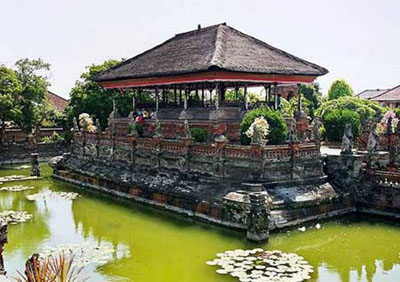Kertha Gosa - Bali Court of Justice
Kertha Gosa tourist object has now become a mute witness of
existence of Klungkung
Kingdom falling on 28 April 1908 to the Dutch administration following
the break of Puputan War. Situated right in the heart of Semarapura
City and within easy reach. It is only 42 km east of
Denpasar. The collapse of Klungkung Kingdom made the Kertha
Gosa merely a customary judicature where the Dutch administration
resolved the customary cases in this institution. Whereas, the
Kertha Gosa previously used to be a venue where to hold assembly
of kings across Bali.

Many buildings in Balinese architectures occur in this complex
of Kertha Gosa such as Taman Gili, Kertha Gosa and Gateway of
Klungkung Kingdom. Kertha Gosa hold a golden carved table and
six chairs. Chairs of which arms having lion motif seated by the
king who acted as chief of the judge. While chair with arms of
ox motif occupied by high priest as legal expert and adviser to
king in making decision, while chairs with dragon arm earmarked
for kanca as registrar. In the meantime, the parties who will
be presided over, either defendant or plaintiff have a seat on
the floor in crossed-leg. Throughout the time of the Dutch administration,
other than the king, controller (Dutch high official) was also
present in the court as the most prominent determining in certain
case. At this pavilion also lies five statues, three of them are
made in China, and remaining two others made by local sculptor
named Pedanda Gede Kreta from Dawan village, Klungkung.
.
On the plafond of Kertha Gosa pavilion occurs delightful paintings
of Kamasan style. Such painting is divided into nine sections
namely:
- First section (bottom) carries the “Tantri Kandaka” narrative. It tells about story of one thousand and one nights of which essence expounds any tricks found in the societal life.
- Second and third section about the Atma Prasangsa (soul in afterlife) where describes the misery of the souls in the hell found by Bima (main figure in the Mahabrata epic). In Bali this narrative is known as Karma Phala (karmic law).
- Fourth section describes the story of mythical bird ‘Garuda” is looking for amerta (immortality), art of Adi Parwa containing the tale of how difficult is the mundane life.
- Fifth section contains Palelindon (earthquake) manual. Earthquake is a portent or world prophecy that is remarkably significant to government and social life.
- Sixth section describe about Bima encountering the Deva (divine light of God) from the heavenly kindom and struggle to save to soul of his father and mother.
- Seventh section is a paradise of the soul. Those how have the religion assuredly believe that they will attain the peaceful abode of the angels when they have habitually performed good deeds during their life time.
- Ninth section gives an account of the Devas function as controller of balance of the world’s four direction. The nine sections are foremost attraction that at all times immortalized by both domestic and foreign tourist.
Meanwhile the Taman Giri also festooned with paintings in Kamasan
style. It is broken up into six sections, namely:
- First section from the lower part describes about palelintangan revealing one’s destiny based on the birth day.
- Second section expounds the story about Mr.Brayut, a couple with their 18 children.
- Third, fourth, fifth and sixth section are about narrative Sutasoma authored by the Sage Tantular written during the rule of King Hayam Wuruk from Majapahit Kingdom (1365) in East Java.
Gorgeous painting of Kamasan style embellishing the ceiling
of Kertha Gosa and Taman Gili have become unparalleled superiority.
Due to the attraction of these paintings, many tourists are amazed
and come here. Interested to visit Kertha Gosa, just book our
East Bali
Tour or book our car
rental with driver, our tour guide or tour driver will be
happy to guide you to this place.














